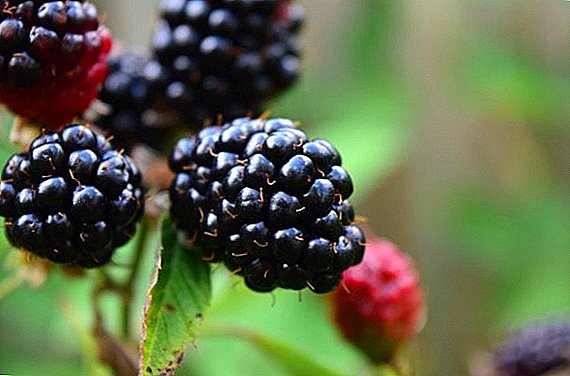
The Venus flytrap is an exotic predatory plant that is increasingly appearing in the collections of indoor flower lovers.
For its cultivation at home is required to comply with special conditions. humidity and air temperature.
We grow from seed
How to grow Venus flytrap from seed? Flycatcher seeds available from an adult plant or purchase them in retail chains. At home, seeds can be obtained exclusively by the method of artificial insemination.
To this end, in the spring, during the appearance of flowers, pollen is transferred from one flower to another with a brush. The procedure is carried out a couple of days after the full disclosure of the bud.
 A month later, ovaries appear on the flowers. The flower forms a box in which it ripens 20-30 seeds. They should be shiny, smooth, black. The collected seeds are stored in a refrigerator in a paper bag. Seeding is carried out four to five months after harvest.
A month later, ovaries appear on the flowers. The flower forms a box in which it ripens 20-30 seeds. They should be shiny, smooth, black. The collected seeds are stored in a refrigerator in a paper bag. Seeding is carried out four to five months after harvest.
Seeds grown independently or purchased must be stratified before planting. Process Lasts 6-8 months.
Seeds are placed in a cloth, moistened with a fungicide, placed in a plastic container and placed in a refrigerator. The container opens during this time and the seeds are moistened.
At the end of the stratification process, it is sown in a mixture of peat and sand or peat moss. The soil is slightly compacted and seed is distributed over the surface. On top, everything is sprinkled with a small amount of peat and moistened with a spray bottle.
About in a month the first cotyledon leaves will appear. After the appearance of these leaves sprouts are planted in separate small pots. A full-fledged plant of such sprouts develops in 4-5 years.
In the photo you can see how to grow a Venus flytrap from seed:





The video shows the experiment: planting, the first shoots that can grow. Carefully choose the seeds.
How to plant seeds
As they sprouted
What grew as a result
Out of Scion
Adult plant division - the most acceptable way to grow the flycatcher. The branches are separated from the bush and planted in separate pots of small diameter, but at the same time of sufficient height for the development of long roots.
 Soil this plant is necessary as light as possible and rather poor. Mix crushed moss, peat moss, peat and sand. Drainage at the bottom of the pot for the flycatcher is not needed.
Soil this plant is necessary as light as possible and rather poor. Mix crushed moss, peat moss, peat and sand. Drainage at the bottom of the pot for the flycatcher is not needed.
In addition to dividing the young plant can be obtained from cuttings. The billet is taken without a riding trap and planted at an angle with the white part into peat.
Before being placed in the soil, the workpiece is treated with a root formation stimulator. From above you need to cover the landing with a glass cap to save one hundred percent moisture.
In 30-35 days the cutting will give the first shoots, a full-fledged root system will be formed in 3-4 months.
From bulb
The onion flycatcher, separated from the bush during transplantation, is placed in a mixture of peat and sand. The onion selected for planting should have at least two rootsotherwise there will be no growth.
ATTENTION. Onion can only be separated from plants older than 2-3 years. The procedure can be performed no more than once every two years.
When placed in a pot, it is important not to fall asleep the growth point of the flower. Sprouting is carried out in greenhouse conditions in a sunny place.
 Whichever way you grow a flycatcher, when the first traps appear need to start feeding. To do this, once every 10-15 days, catch a fly, pin it with a needle and place it inside the sheet.
Whichever way you grow a flycatcher, when the first traps appear need to start feeding. To do this, once every 10-15 days, catch a fly, pin it with a needle and place it inside the sheet.
Growth of the flycatcher with such a feed will accelerate, and you will quickly get a full-fledged plant. Learn more about the better and safer to feed the plant, find out here.
Observing all the rules of reproduction, you can get new copies of this exotic plant in the home collection of flowers.












